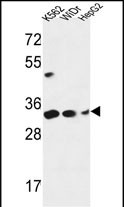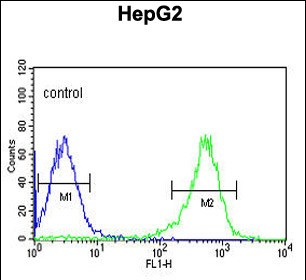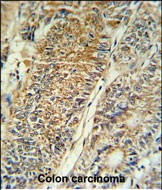


| WB | 1/1000 | Human,Mouse,Rat |
| IF | 咨询技术 | Human,Mouse,Rat |
| IHC | 1/100-1/500 | Human,Mouse,Rat |
| ICC | 技术咨询 | Human,Mouse,Rat |
| FCM | 1/10-1/50 | Human,Mouse,Rat |
| Elisa | 咨询技术 | Human,Mouse,Rat |
| Aliases | Pyrroline-5-carboxylate reductase 1, mitochondrial, P5C reductase 1, P5CR 1, PYCR1 |
| Entrez GeneID | 5831 |
| WB Predicted band size | 33.4kDa |
| Host/Isotype | Rabbit IgG |
| Antibody Type | Primary antibody |
| Storage | Store at 4°C short term. Aliquot and store at -20°C long term. Avoid freeze/thaw cycles. |
| Species Reactivity | Human |
| Immunogen | This PYCR1 antibody is generated from rabbits immunized with a KLH conjugated synthetic peptide between 291-319 amino acids from the C-terminal region of human PYCR1. |
| Formulation | Purified antibody in PBS with 0.05% sodium azide. |
+ +
1. **"PYCR1 is a novel target for the treatment of melanoma"**
- **作者**: Tang X, Lin J, Wang G, Lu J.
- **摘要**: 研究证实PYCR1在皮肤黑色素瘤中高表达,通过抗体检测发现其与肿瘤增殖和患者预后不良相关,提示PYCR1可能成为治疗靶点。
2. **"Proline biosynthesis regulates cancer cell survival through mitochondrial respiration"**
- **作者**: De Ingeniis J, Ratnikov B, et al.
- **摘要**: 揭示PYCR1通过催化脯氨酸合成调控线粒体代谢,使用特异性抗体验证其在结直肠癌细胞中的表达,并证明抑制PYCR1可诱导癌细胞凋亡。
3. **"Age-related epidermal barrier dysfunction is linked to PYCR1 deficiency"**
- **作者**: Rezvani HR, Kim AL, et al.
- **摘要**: 通过抗体检测发现衰老皮肤中PYCR1表达降低,实验表明其缺失导致胶原合成减少和皮肤屏障损伤,提示PYCR1在皮肤衰老中的作用。
4. **"PYCR1 as a potential biomarker for hepatocellular carcinoma"**
- **作者**: Kang YP, Mockabee-Macias A, et al.
- **摘要**: 利用免疫组化(PYCR1抗体)分析肝癌组织,显示PYCR1过表达与肿瘤转移相关,可能作为肝癌诊断和预后的生物标志物。
PYCR1 (Pyrroline-5-Carboxylate Reductase 1) is a mitochondrial enzyme critical for proline biosynthesis, catalyzing the NAD(P)H-dependent reduction of pyrroline-5-carboxylate (P5C) to proline. This metabolic pathway is essential for maintaining cellular redox balance, collagen synthesis, and mitochondrial function. PYCR1 is implicated in multiple physiological processes, including cell proliferation, apoptosis, and stress response. Dysregulation of PYCR1 has been linked to various diseases, particularly cancers (e.g., melanoma, hepatocellular carcinoma) and neurodevelopmental or age-related disorders, where its overexpression often correlates with tumor progression, metastasis, or oxidative stress resistance.
PYCR1 antibodies are immunological tools designed to detect and quantify PYCR1 protein expression in research applications. These antibodies are widely used in techniques such as Western blotting, immunohistochemistry (IHC), and immunofluorescence (IF) to study PYCR1's tissue distribution, subcellular localization, and expression patterns under different pathological conditions. Validated PYCR1 antibodies help elucidate its role in metabolic reprogramming of cancer cells, a hallmark of tumorigenesis, and its potential as a therapeutic target. Recent studies also explore its involvement in cellular senescence and fibrosis. Researchers prioritize antibodies with high specificity, often verified via knockout controls, to ensure accurate detection given structural similarities within the PYCR enzyme family (PYCR1-3). Commercial PYCR1 antibodies are typically raised against conserved epitopes, enabling cross-reactivity in human, mouse, and rat models.
×